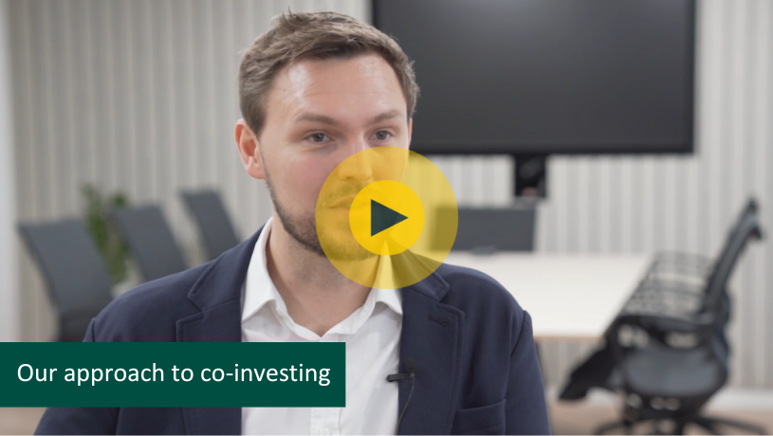Invest in single asset private market transactions overseen by best-in-class managers. Co-investments offer the opportunity for portfolio diversification and potential for attractive risk-adjusted returns.
Through our industry relationships we are able to offer private investors access to co-invest deals that they would rarely be able to access otherwise.
What is a co-investment?
Co-investments are where individuals invest in a transaction alongside funds advised and managed by an independent sponsor who has originated and is leading the deal. This means investors can take advantage of the due diligence an experienced manager has commissioned and underwritten in terms of cost.
What types of co-investment do we offer?
The co-investments we offer to our clients are backed by specialist managers and institutional investors. They are typically:
1) Private equity or private debt investments in mid-market companies.
This includes private equity buyouts, growth capital and private credit investment opportunities. The investee companies tend to occupy the mid-market and are often larger businesses than those targeted by our in-house private equity and private debt team. This complementary offering means our clients have increased variety in their SME exposure.
2) Later stage funding rounds in fast-growing technology companies with global propositions.
While we believe that investing in early stage/start up businesses is best done through a fund portfolio, later stage funding rounds (series-C and beyond), which are focused on scaling the company and growing it as quickly and as successfully as possible, can present attractive opportunities for private investors to diversify and target high growth. These companies are often the identified ‘winners’ from a venture capital manager’s portfolio.
3) Single asset property transactions
Off-market income, redevelopment or planning-based investment opportunities.
What all our co-investments have in common is that they are not deals that are ordinarily accessible by private investors, but through Connection Capital you can invest from £25,000.
Our approach to co-investing
We aim to select expert managers, who have ‘skin in the game’ and present their strongest assets for co-investment. In some instances, these will be in private equity or private debt funds previously supported by Connection Capital clients, allowing them to ‘double down’ on a specific company in the fund portfolio.
We approach each opportunity on its own merits and look to present our clients with a diverse array of deals to consider.
Our sourcing strategy is a mixture of inbound and outbound contact. We find the most important factor in sourcing high-quality co-investments is through the relationships we have built within the private markets industry over a long period of time. This is very difficult to replicate or shortcut.
Peter Knight, Head of Co-investments, discusses how we source high quality, single asset co-investment opportunities through our team’s longstanding relationships in private markets and Connection Capital’s reputation. Click the image to watch.
What are the benefits of co-investment?
Co-investments combine the best aspects of direct investing and fund investing, providing investors with multiple benefits, including:
Potential for higher, risk-adjusted returns:
Whether it is a private equity, private debt or property co-invest, we only select those with strong risk-adjusted returns.
Diversification through single company mid-market private equity transactions:
As co-investments tend to be in larger individual companies than those targeted by Connection Capital’s Direct Investment team, our clients are able to add direct exposure to mid-market companies to their portfolio. It is unusual that private investors would otherwise be able to access these types of transactions at this level of the market.
Expert asset management by specialist investors
By partnering with specialists with demonstrable track records, who have undertaken rigorous due diligence on the opportunity, we gain the same level of confidence in a transaction as when we make a direct investment ourselves. Where an asset is in a particularly niche sector or, for instance, in a new geography, investors have the assurance that the deal is being managed by an expert in that area, in addition to the scrutiny Connection Capital subjects the deal to at outset.
Reduced J-curve
Co-investments can have shorter periods to distributions and exits than investments made through a fund structure. This is because, in a co-invest, capital is being deployed into the asset immediately (in some cases it already has been deployed and put to work and the lead investor is selling down a stake) versus a fund model where there can be a separate fundraising period, often taking 12-24 months, and then an investment period to put those funds raised to work.
No ‘blind pool’ risk
Unlike investing in a fund, there is no ‘blind pool risk’ with co-investments. You control your exposure by choosing to invest in a specific single asset, rather than investing in a fund and a manager having full discretion.
Control over timing of capital calls
Co-investments, similar to direct investments, require 100% of capital pledged to be committed when the deal completes. There is no staggered drawdown, taking place over months/years. This can be preferred by some investors when managing their own cashflows.
Access to investments from non-traditional sources:
Co-investing also offers access to transactions that aren’t run through funds and may not arise from traditional private equity firms. We’ve seen the rise of ‘fundless sponsors’ over the past decade, where capital is raised on a deal-by-deal basis for investments, rather than the traditional fund model.
You should remember that despite these benefits there are of course risks involved with any type of investment (you can read more here).
Why do managers make co-investments?
Co-investments are not just attractive to private investors, they can be beneficial for private managers too, whether they operate a fund or a ‘deal by deal’ model. They offer a different fundraising route and the opportunity for the manager to make larger single asset investments than may be possible through a fund (due to limits on the size or proportion of the fund invested in an individual holding), and then ‘sell down’ part of the investment to Limited Partners (LPs) directly, via a co-invest, and retain exposure to the asset.
This is an established private market investment process. Since 2000, over $175 billion has been raised in co-investment funds (source: BlackRock).
Our experience in co-investing
We have provided clients with access to a range of differentiated co-invest opportunities. Examples include:
- Restaurant chain Wagamama alongside Duke Street and Hutton Collins.
- UK banking fintech Thought Machine Group, alongside deeptech investor IQ Capital.
- Access to a £87m Series-C funding round for fast-growing, disruptive, payments-as-a-service business Modulr, via our relationship with venture builder Blenheim Chalcot.
- Co-investment in the off-market £265m management buyout of UK-based generics pharmaceutical business Essential Pharma, alongside Headway Capital Partners and Gyrus Capital
- Rosa’s Thai (restaurant chain) and Sk:n Clinics (high street dermatology specialist) alongside private equity manager TriSpan.

Private Equity
Thought Machine
Series C funding round for fast-growing UK fintech providing cloud banking solution to established and challenger banks.
Discover more
Private Equity
Essential Pharma
£265m off-market management buyout of UK-based generics pharmaceutical business.
Discover more
Co-investments
Thistle Initiatives Group Limited
£5.6m co-investment into an unlevered £23m MBO of a leading financial services compliance consultancy with significant growth potential.
Discover more
Private Equity
Modulr
A fast-growing 'payments as a service' platform with a disruptive customer proposition and an emerging leadership position in a massive global market.
Discover more
Private Debt
BW Legal Services
A leading legal services business specialising in the outsourced collection of high value, low volume overdue consumer receivables.
Discover more
Private Equity
Rosa's Thai Cafe
Investment in management buyout at high growth Thai restaurant chain.
Discover more
Private Equity
Wagamama
Co-investment in well-known high street chain of noodle restaurants.
Discover more


